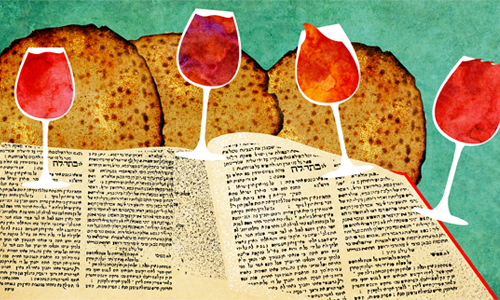Today I must give thanks for the perseverance of our people and the cultivation of the traditions that, like Pesach, are transmitted generation after generation through the education that our Imams and Sabbaths gave us. Although many of them are no more with us, they remain alive in our souls and hearts forever like that light that the stars give off beyond time, sheltering us with their wise advice and nice memories.
That is why all my brothers in the diaspora that make up the twelve tribes of Israel, whether they are Sephardic, Chueta, Magrebies, Yemenite, Karaite, Beta Israel, Romaniotas, Italkim, Ashkenazites, Gruzim, Bukharians, Mizrajíes, Parsim, Baghdadis and Cochin must today be recognized as seeds of the same tree that gave us life. Although we are very different, we have to conceive ourselves ancestrally united by the name of Hashem, breath and transformation that moves the entire Universe, being the verb of all visible and non-visible creation as well as the palpitation of our human heritage and ultimately the only G-d.
So today I want to add myself like a drop of water in the sea to the great history that precedes us 5781 years ago and before which we must keep the respect it deserves on these dates of recollection and raise our prayers on behalf of all those who have lost his life defending who we are and where we come from, either with his writings, songs or family traditions that reflect that we have been here for centuries and that we will continue to be here beyond everything.
When you begin your Pesach Seder and remember the history of the People of Israel, feel blessed to keep the words of your ancestors beyond memory, by bequeathing you the right to be free in any time and place, because at the end of the day we are made as humanity from the same dust and source of light that the stars possess for eternity.
In this way, I especially thank the Diario Judío de México and the Revista eSefarad de Argentina for the publication of (La Quema de Troyes 1288) or (Lamento de Troyes) a Medieval Elegy that tells the story of a part of my family in Hebrew characters protected in the National Archives of France and in the Vatican Library and that describes the devotion of thirteen Sephardic Jews of the Middle Ages who until their last breath on April 24, 1288, defended their culture, tradition and faith before being assassinated in the name of intolerance and discrimination carried out by means of a new pogrom in Gaul at the end of the thirteenth century.
I want to emphasize that we as Jews and brothers must preserve and transmit our history, because the history of each one is the semblance of all of us and therefore today I wish to share the Medieval Elegy in Hebrew characters that complies more than seven centuries and that has characterized my family guarding this story of loving their G-d with dedication, along with the testimony of commitment that comes with being a Jew even beyond this life.
I must also thank the research published by Susan Einbinder, Ph.D. in History and professor of Hebrew and Judaic studies, of the University of Connecticut in the United States and with whom I had a beautiful conversation a few months ago, where I expressed my recognition for her valuable work entitled “The Lament of Troyes: Jewish Martyrology in Hebrew and old french which is part of her book Beautiful Death.
This chronicle is the reflection that neither the fire of the inquisition, nor centuries of intolerance and persecution will can to erase our identity that lives in the past, present and future of every Jewish soul in diaspora.
Jag Sameaj Pesah !!!
In memory of Baruch D´Avirrey or Baruch Tob Elem (Bonfils) my maternal ancestor and Isaac Chatelain, his wife, his son and his daughter-in-law.
Salomón or Salamín Ben Vivant, son of Phebus.
Samson, Kadmon.
Simón, the singer of Châtillón.
Jonah or Lebeau Colón, the Rabbi.
Isaac Cohen.
Hayyim de Brinon, the master surgeon.
Hayyim de Chaurse.


























